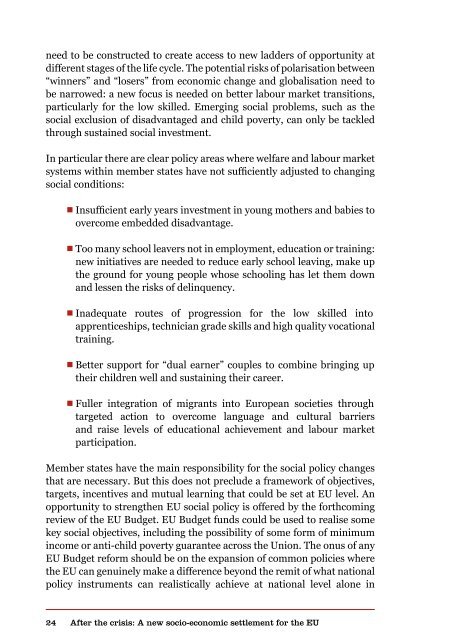Authors Iain Begg | Gabriel Glöckler | Anke Hassel ... - The Europaeum
Authors Iain Begg | Gabriel Glöckler | Anke Hassel ... - The Europaeum
Authors Iain Begg | Gabriel Glöckler | Anke Hassel ... - The Europaeum
You also want an ePaper? Increase the reach of your titles
YUMPU automatically turns print PDFs into web optimized ePapers that Google loves.
need to be constructed to create access to new ladders of opportunity at<br />
different stages of the life cycle. <strong>The</strong> potential risks of polarisation between<br />
“winners” and “losers” from economic change and globalisation need to<br />
be narrowed: a new focus is needed on better labour market transitions,<br />
particularly for the low skilled. Emerging social problems, such as the<br />
social exclusion of disadvantaged and child poverty, can only be tackled<br />
through sustained social investment.<br />
In particular there are clear policy areas where welfare and labour market<br />
systems within member states have not sufficiently adjusted to changing<br />
social conditions:<br />
n Insufficient early years investment in young mothers and babies to<br />
overcome embedded disadvantage.<br />
n Too many school leavers not in employment, education or training:<br />
new initiatives are needed to reduce early school leaving, make up<br />
the ground for young people whose schooling has let them down<br />
and lessen the risks of delinquency.<br />
n Inadequate routes of progression for the low skilled into<br />
apprenticeships, technician grade skills and high quality vocational<br />
training.<br />
n Better support for “dual earner” couples to combine bringing up<br />
their children well and sustaining their career.<br />
n Fuller integration of migrants into European societies through<br />
targeted action to overcome language and cultural barriers<br />
and raise levels of educational achievement and labour market<br />
participation.<br />
Member states have the main responsibility for the social policy changes<br />
that are necessary. But this does not preclude a framework of objectives,<br />
targets, incentives and mutual learning that could be set at EU level. An<br />
opportunity to strengthen EU social policy is offered by the forthcoming<br />
review of the EU Budget. EU Budget funds could be used to realise some<br />
key social objectives, including the possibility of some form of minimum<br />
income or anti-child poverty guarantee across the Union. <strong>The</strong> onus of any<br />
EU Budget reform should be on the expansion of common policies where<br />
the EU can genuinely make a difference beyond the remit of what national<br />
policy instruments can realistically achieve at national level alone in<br />
24<br />
After the crisis: A new socio-economic settlement for the EU

















